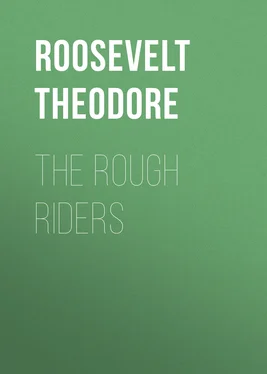Theodore Roosevelt - The Rough Riders
Здесь есть возможность читать онлайн «Theodore Roosevelt - The Rough Riders» — ознакомительный отрывок электронной книги совершенно бесплатно, а после прочтения отрывка купить полную версию. В некоторых случаях можно слушать аудио, скачать через торрент в формате fb2 и присутствует краткое содержание. Жанр: foreign_prose, История, foreign_edu, foreign_antique, на английском языке. Описание произведения, (предисловие) а так же отзывы посетителей доступны на портале библиотеки ЛибКат.
- Название:The Rough Riders
- Автор:
- Жанр:
- Год:неизвестен
- ISBN:нет данных
- Рейтинг книги:3 / 5. Голосов: 1
-
Избранное:Добавить в избранное
- Отзывы:
-
Ваша оценка:
- 60
- 1
- 2
- 3
- 4
- 5
The Rough Riders: краткое содержание, описание и аннотация
Предлагаем к чтению аннотацию, описание, краткое содержание или предисловие (зависит от того, что написал сам автор книги «The Rough Riders»). Если вы не нашли необходимую информацию о книге — напишите в комментариях, мы постараемся отыскать её.
The Rough Riders — читать онлайн ознакомительный отрывок
Ниже представлен текст книги, разбитый по страницам. Система сохранения места последней прочитанной страницы, позволяет с удобством читать онлайн бесплатно книгу «The Rough Riders», без необходимости каждый раз заново искать на чём Вы остановились. Поставьте закладку, и сможете в любой момент перейти на страницу, на которой закончили чтение.
Интервал:
Закладка:
Greenway was from Arkansas. We could have filled up the whole regiment many times over from the South Atlantic and Gulf States alone, but were only able to accept a very few applicants. One of them was John McIlhenny, of Louisiana; a planter and manufacturer, a big-game hunter and book-lover, who could have had a commission in the Louisiana troops, but who preferred to go as a trooper in the Rough Riders because he believed we would surely see fighting. He could have commanded any influence, social or political, he wished; but he never asked a favor of any kind. He went into one of the New Mexican troops, and by his high qualities and zealous attention to duty speedily rose to a sergeantcy, and finally won his lieutenancy for gallantry in action.
The tone of the officers' mess was very high. Everyone seemed to realize that he had undertaken most serious work. They all earnestly wished for a chance to distinguish themselves, and fully appreciated that they ran the risk not merely of death, but of what was infinitely worse—namely, failure at the crisis to perform duty well; and they strove earnestly so to train themselves, and the men under them, as to minimize the possibility of such disgrace. Every officer and every man was taught continually to look forward to the day of battle eagerly, but with an entire sense of the drain that would then be made upon his endurance and resolution. They were also taught that, before the battle came, the rigorous performance of the countless irksome duties of the camp and the march was demanded from all alike, and that no excuse would be tolerated for failure to perform duty. Very few of the men had gone into the regiment lightly, and the fact that they did their duty so well may be largely attributed to the seriousness with which these eager, adventurous young fellows approached their work. This seriousness, and a certain simple manliness which accompanied it, had one very pleasant side. During our entire time of service, I never heard in the officers' mess a foul story or a foul word; and though there was occasional hard swearing in moments of emergency, yet even this was the exception.
The regiment attracted adventurous spirits from everywhere. Our chief trumpeter was a native American, our second trumpeter was from the Mediterranean—I think an Italian—who had been a soldier of fortune not only in Egypt, but in the French Army in Southern China. Two excellent men were Osborne, a tall Australian, who had been an officer in the New South Wales Mounted Rifles; and Cook, an Englishman, who had served in South Africa. Both, when the regiment disbanded, were plaintive in expressing their fond regret that it could not be used against the Transvaal Boers!
One of our best soldiers was a man whose real and assumed names I, for obvious reasons conceal. He usually went by a nickname which I will call Tennessee. He was a tall, gaunt fellow, with a quiet and distinctly sinister eye, who did his duty excellently, especially when a fight was on, and who, being an expert gambler, always contrived to reap a rich harvest after pay-day. When the regiment was mustered out, he asked me to put a brief memorandum of his services on his discharge certificate, which I gladly did. He much appreciated this, and added, in explanation, "You see, Colonel, my real name isn't Smith, it's Yancy. I had to change it, because three or four years ago I had a little trouble with a gentleman, and—er—well, in fact, I had to kill him; and the District Attorney, he had it in for me, and so I just skipped the country; and now, if it ever should be brought up against me, I should like to show your certificate as to my character!" The course of frontier justice sometimes moves in unexpected zigzags; so I did not express the doubt I felt as to whether my certificate that he had been a good soldier would help him much if he was tried for a murder committed three or four years previously.
The men worked hard and faithfully. As a rule, in spite of the number of rough characters among them, they behaved very well. One night a few of them went on a spree, and proceeded "to paint San Antonio red." One was captured by the city authorities, and we had to leave him behind us in jail. The others we dealt with ourselves, in a way that prevented a repetition of the occurrence.
The men speedily gave one another nicknames, largely conferred in a spirit of derision, their basis lying in contrast. A brave but fastidious member of a well-known Eastern club, who was serving in the ranks, was christened "Tough Ike"; and his bunkie, the man who shared his shelter-tent, who was a decidedly rough cow-puncher, gradually acquired the name of "The Dude." One unlucky and simple-minded cow-puncher, who had never been east of the great plains in his life, unwarily boasted that he had an aunt in New York, and ever afterward went by the name of "Metropolitan Bill." A huge red-headed Irishman was named "Sheeny Solomon." A young Jew who developed into one of the best fighters in the regiment accepted, with entire equanimity, the name of "Pork-chop." We had quite a number of professional gamblers, who, I am bound to say, usually made good soldiers. One, who was almost abnormally quiet and gentle, was called "Hell Roarer"; while another, who in point of language and deportment was his exact antithesis, was christened "Prayerful James."
While the officers and men were learning their duties, and learning to know one another, Colonel Wood was straining every nerve to get our equipments—an effort which was complicated by the tendency of the Ordnance Bureau to send whatever we really needed by freight instead of express. Finally, just as the last rifles, revolvers, and saddles came, we were ordered by wire at once to proceed by train to Tampa.
Instantly, all was joyful excitement. We had enjoyed San Antonio, and were glad that our regiment had been organized in the city where the Alamo commemorates the death fight of Crockett, Bowie, and their famous band of frontier heroes. All of us had worked hard, so that we had had no time to be homesick or downcast; but we were glad to leave the hot camp, where every day the strong wind sifted the dust through everything, and to start for the gathering-place of the army which was to invade Cuba. Our horses and men were getting into good shape. We were well enough equipped to warrant our starting on the campaign, and every man was filled with dread of being out of the fighting. We had a pack-train of 150 mules, so we had close on to 1,200 animals to carry.
Of course, our train was split up into sections, seven, all told; Colonel Wood commanding the first three, and I the last four. The journey by rail from San Antonio to Tampa took just four days, and I doubt if anybody who was on the trip will soon forget it. To occupy my few spare moments, I was reading M. Demolins's "Superiorite des Anglo-Saxons." M. Demolins, in giving the reasons why the English-speaking peoples are superior to those of Continental Europe, lays much stress upon the way in which "militarism" deadens the power of individual initiative, the soldier being trained to complete suppression of individual will, while his faculties become atrophied in consequence of his being merely a cog in a vast and perfectly ordered machine. I can assure the excellent French publicist that American "militarism," at least of the volunteer sort, has points of difference from the militarism of Continental Europe. The battalion chief of a newly raised American regiment, when striving to get into a war which the American people have undertaken with buoyant and light-hearted indifference to detail, has positively unlimited opportunity for the display of "individual initiative," and is in no danger whatever either of suffering from unhealthy suppression of personal will, or of finding his faculties of self-help numbed by becoming a cog in a gigantic and smooth-running machine. If such a battalion chief wants to get anything or go anywhere he must do it by exercising every pound of resource, inventiveness, and audacity he possesses. The help, advice, and superintendence he gets from outside will be of the most general, not to say superficial, character. If he is a cavalry officer, he has got to hurry and push the purchase of his horses, plunging into and out of the meshes of red-tape as best he can. He will have to fight for his rifles and his tents and his clothes. He will have to keep his men healthy largely by the light that nature has given him. When he wishes to embark his regiment, he will have to fight for his railway-cars exactly as he fights for his transport when it comes to going across the sea; and on his journey his men will or will not have food, and his horses will or will not have water and hay, and the trains will or will not make connections, in exact correspondence to the energy and success of his own efforts to keep things moving straight.
Читать дальшеИнтервал:
Закладка:
Похожие книги на «The Rough Riders»
Представляем Вашему вниманию похожие книги на «The Rough Riders» списком для выбора. Мы отобрали схожую по названию и смыслу литературу в надежде предоставить читателям больше вариантов отыскать новые, интересные, ещё непрочитанные произведения.
Обсуждение, отзывы о книге «The Rough Riders» и просто собственные мнения читателей. Оставьте ваши комментарии, напишите, что Вы думаете о произведении, его смысле или главных героях. Укажите что конкретно понравилось, а что нет, и почему Вы так считаете.












